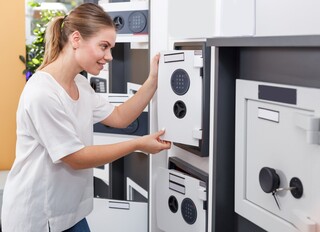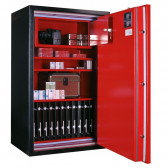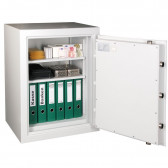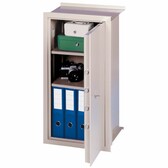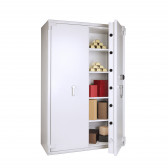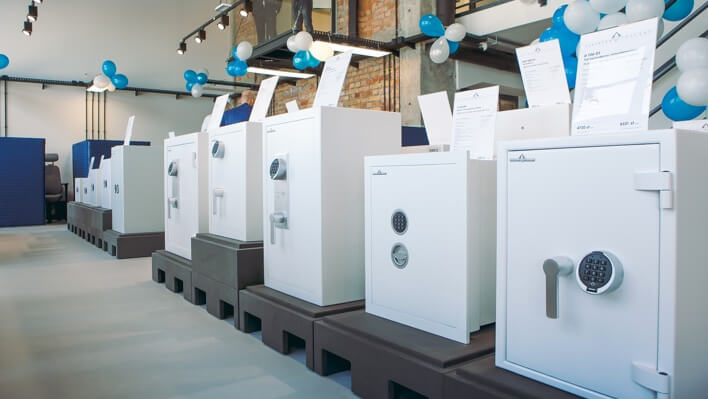Choosing a safe is an important decision that requires a thorough understanding of the options available and their benefits. A safe is used to store valuable items such as money, jewellery, documents or weapons, so it should be robust, burglary and fire resistant and easy to use. Here are some criteria to consider when choosing a safe:
The capacity of the safe: the safe should be large enough to hold all the items you want to secure in it. Future needs and the possibility of expanding the collection should also be considered. Safes come in different sizes and shapes, from small boxes to large cabinets.
Type of lock: safes can be opened with a key, mechanical combination lock, digital code, fingerprint or a combination of these methods. Each type of security has its own advantages and disadvantages.
• A key is simple to use, but can be lost or stolen.
• A mechanical lock is reliable but requires patience and precision.
• A digital code is easy to remember but can be overheard or broken. Safes with an electronic lock are the most common choice.
• A fingerprint is unique and difficult to forge, but can be inaccurate or undetectable if there is dirt or wounds on the finger.
Security class: safes are rated for burglary and fire resistance. Burglary resistance determines the time it takes for the safe to be forced through using various tools and methods. Fire resistance determines the length of time the safe protects the contents from heat and flames. The higher the degree of protection, the more expensive the safe.
Mounting location: the safe can be located in various places in a house or office, such as in a wardrobe, under a bed, behind a painting or in a wall. Choose a location that is discreet, easily accessible and adequately protected against moisture and mechanical damage. The safe can also be fixed to the floor or wall with screws or anchors to make it difficult to move or balance it.
Who needs a safe?
This is a question to which there is no clear answer. It is also different for a safe for home and a safe for a business.
A home safe – do you need one?
Some people believe that a home safe is an unnecessary expense that takes up space and does not provide a sufficient level of security. Others, on the other hand, believe that a home safe is an essential piece of equipment that protects their valuables, documents and money from theft, fire or other threats. In this article, we will outline some of the arguments for and against having a home safe, as well as give you tips on how to choose the right model for your needs.
Which home safe should you choose?
You will primarily need a home safe to store money, jewellery, documents and valuable items such as family heirlooms. If you want to protect these from theft, it is worth choosing a home safe with a high resistance rating. The burglary resistance grade, the weight of the safe and the correct installation are the basic features that make up the level of security in safes.
It is a good idea to choose a safe for home that has additional fire resistance. Even a fire resistance rating of 30 minutes can protect its contents from damage.
A home safe can be free-standing, in which case the weight of the safe is greatest and the level of burglary protection most complete. When choosing a safe for the home, however, you can choose wall-mounted models. A wall-mounted safe is not visible at first glance, and you also save space. A wall safe is the ideal home safe for a small space.
How to choose a home safe?
Before buying a home safe, you need to answer some basic questions:
• What are your most valuable belongings you want to protect from theft?
• What size do you want your home safe to be?
• Where do you want to install the safe?
• What equipment do you want your safe to have?
• What lock do you want the safe to have?
You can do this yourself. We offer almost all categories of home safes, there are lighter and heavier models. There will be a small home safe that you will fit into a cupboard, but if the ideal level of security requires individual solutions, it is best to talk to an adviser about this.
The property security industry is surprisingly complex for many clients and they often ask for help with the purchase of a safe for their home. A professional and experienced account manager will help guide you through the entire purchasing process, starting with defining your needs.
Safe in business
The use of safes in businesses differs from a private one. While a safe in a house is primarily used to store cash, valuables and items that do not require larger capacities, the business use of safes is broader.
Companies and institutions also sometimes need to store cash somewhere, but the main task is to ensure a high level of security for documents and data carriers.
This is why we offer a wide range of safes for companies:
• burglar-proof safes,
• fireproof safes for documents,
• fireproof safes for data media,
• safes for keys,,
• safes for flammable materials.
In order to choose the right safe, it is first of all necessary to be directed by the guidelines from which the need to purchase a safe itself arises.
In light of current data protection legislation, almost every company or institution needs a safe to store important documents containing such data. If you work for a larger organisation, there is probably someone responsible for determining for what and what devices you need, including what security class. If, on the other hand, you are running a sole proprietorship you will be following a similar process as you would when buying a safe for your home.
How do I fit a safe?
Fitting a safe is a very important part of the process of securing property. Most burglaries take a few minutes or so. During this time, burglars will primarily try to take the safe to a place that is secure for them, where they can access its contents without time pressure. Correct installation with steel or chemical anchors provides effective protection against attempted removal. It is essential to ensure that there are no electrical wires or pipes in the mounting area.
Find out how and where to install a safe at home..
How much does a home safe cost? What is the price of a safe for a business?
In both cases, the price of the safe will be a direct result of its quality, the burglary and/or fire resistance class, the lock used (an electronic lock is more expensive than a key lock). Both home safes and business safes are contractual, interpenetrating terms, so it is not easy to answer the question "how much does it cost?".
Supermarket safes for a few hundred zloty should certainly be avoided. Such a device does not present the slightest obstacle to a burglar, and the mere presence of such a safe will draw his attention, so if the home safe is to be used to store weapons, valuables or very precious items, it is worth investing in something better.
Summary
Buying a safe for your home or business is not easy. Individual models differ from each other in features which are sometimes incomprehensible to the novice customer, who asks: which safe for the home should I select? This is why we try to approach each of you individually and listen to your needs. If you have any questions, please call or write us and we will guide you step by step from start to finish.
